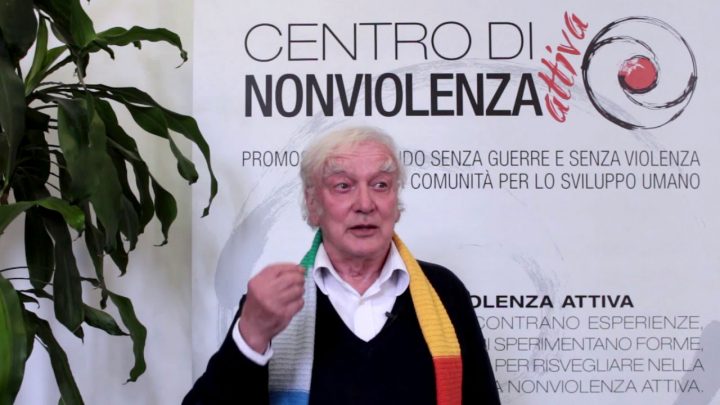As the European Humanist Forum approaches, we’re taking the opportunity to interview our speakers about the ideas behind the Forum.
Piero P. Giorgi is an Italian neuroscientist whose education took him from Bologna, to the UK, Switzerland and then to the University of Queensland in Brisbane, Australia, where he established a degree programme in Peace Studies before retiring in 2004.
EHF2018: Piero, what sparked off your interest in peace and nonviolence?
PPG: In 1986, during a Palm Sunday Day march for peace, I discovered that peace should be studied, not just shouted in the streets. I then thought of using my knowledge of the human brain and behaviour to investigate the origin of violence. Thirty years and many publications later I can confidently present the new hypothesis of a nonviolent human nature (nothing to do with J. J. Rousseau) supported by six multidisciplinary scientific pieces of evidence. The term “human nature” refers to our biocultural (not to biology only) evolution[1].
EHF2018: There are many who see human beings in a “Darwinian” way, as a product of the survival of the fittest. To some, human beings are “naturally” violent. How do you see this?
PPG: As a brief introduction, it is necessary to know that a) the terms “evolution” and “survival of the fittest” (both terms not correct) were never used by Charles Darwin, but by Herbert Spencer (not a scientist, almost a charlatan), and that b) the transmutation of species was first proposed by Jean B. de Lamarck (1809), while Darwin “only” proposed natural selection (1859) as a mechanism to explain the transmutation of species.
Why do the media and school teaching only mention Darwin when referring to “evolution”, and not Lamarck and not modern authors (Julian Huxley, George G. Simpson, Francisco J. Ayala, etc.) who have offered a correct, up-to-date presentation of this important theory of biology? Why is the wrong terminology of H. Spencer referred to as Darwin’s words, and why has this been disseminated so well to the public? Unfortunately science is not exempt from political influences.
Moreover, the wrong idea that human beings are “naturally” violent, which was already disproved decades ago, is still being supported by governments (that like to be exonerated from implementing the radical social changes necessary to prevent violence), by upper-class layers of society (that feel “naturally” placed to dominate human affairs), and by middle-class layers too (that feel disturbed by the prospect of changing their life style and conservative attitude).
However, an increasing number of scientists (especially neuroscientists and anthropologists) are now providing strong pieces of evidence supporting the new idea that our species, Homo sapiens, is naturally nonviolent (in terms of biocultural evolution, not genetics), with violence having appeared quite recently (5-6,000 years ago) through a “rapid” cultural process (see link mentioned above). This human tragedy occurred after the invention of food production and the consequent emergence of large, stratified human settlements, where we have gradually lost our humanity through the introduction of structural violence, direct violence and war.
Now that we know who we are (our nonviolent human nature), we can start removing the high levels of violence perpetrated against humans and the environment.
EHF2018: You will be speaking in the working group on Humanist and Nonviolent Education. Can you tell us about some of the major themes that you think are important to develop in this area?
PPG: Education can operate in many ways, not just in formal school training.
The most effective “education” could operate non-verbally during the first five years of life: relationships between mothers and their babies completely different from the current ones, and social models offered to small kids (who are naturally designed to imitate) very different from the current ones. During these initial years of life we have the opportunity of creating (nonviolent) human beings, but we are not doing so.
During another important period of life, between five and fifteen years of age, we could use formal school education to prepare effective citizens, that means creative and socialized youngsters, but we prefer to prepare obedient students and future conservative consumers. In this case conservative means structurally violent.
Adolescents still maintain some forms of idealism (interestingly, much discouraged), which can take both destructive and constructive directions. Again, constructive social models could influence the choice in question, but these are rare and ignored by the mass media.
Young adults are generally too busy entering into the competitive game of consumerism to attempt an unconventional life style such as nonviolence. The cases of conversions are too rare to support today’s urgency of countering violence (we are a species at risk of a rapid extinction).
Old age could reserve surprises of delayed wisdom, but too late to play an effective role.
EHF2018: The idea behind the Forum is to bring people together from various fields and discover “what unites us”. For you, why is it important that this Forum takes place, and for you, what is it that unites us?
PPG: As a professional scientist studying human nature, I have always been searching common traits among human beings. Philosophers, sociologists and classical anthropologists focused, instead, on the diversities of the 6-7,000 human cultures existing on the Earth and concluded that such diversity makes the definition of human nature impossible. I followed, instead, modern ideas of evolutionary biologists and discovered several pieces of evidence that Palaeolithic Homo sapiens, at least from 50,000 years ago or even earlier, was nonviolent. Interestingly, all contemporary nomadic hunter-gatherers (about 20 cultures) are also nonviolent. These two types of distant models represent true human beings and can be used to define human nature (attention, J. J. Rousseau has nothing to do with this).
This is what could unite us: empathy, solidarity, cooperation, nonviolence, spirituality (not religion), and respect for nature. But we have gradually lost these human characteristics and culturally adopted violence by educating children very effectively to become violent, because this favours the minority that leads modern stratified societies.
[1] For a summary see www.pierogiorgi.org/detailed-academic-cv-and-publications/peace-studies/ last entry.






